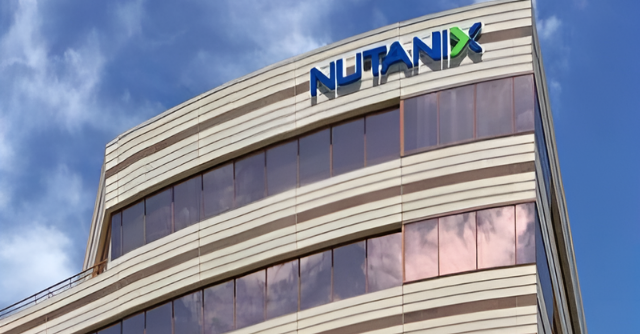
How Nutanix is driving AI in its internal operations


Major IT companies benefit from the ability to integrate their own solutions, which not only lowers overall costs but also significantly improves their services and offerings. US-based cloud and software company Nutanix also embeds Artificial Intelligence (AI) into its internal business processes.
 At the company’s flagship event - .Next 2025 – hosted in Washington DC last week, Manosiz Bhattacharyya, chief technology officer (CTO) of Nutanix and Debojyoti Dutta, Chief AI Officer (CAIO) at Nutanix, explain how Nutanix Enterprise AI is not just something the company sells to its customers; it extends beyond external customer offerings to encompass various internal departments within the company.
At the company’s flagship event - .Next 2025 – hosted in Washington DC last week, Manosiz Bhattacharyya, chief technology officer (CTO) of Nutanix and Debojyoti Dutta, Chief AI Officer (CAIO) at Nutanix, explain how Nutanix Enterprise AI is not just something the company sells to its customers; it extends beyond external customer offerings to encompass various internal departments within the company.
Bhattacharyya said that Nutanix employs a three-pronged AI strategy: AI on Nutanix (enabling customers to run AI applications on the platform), AI in Nutanix (integrating AI into internal processes for efficiency and better decision-making), and AI with Nutanix (a symbiotic vision for Nutanix and AI technologies).

Initially, "AI on Nutanix" offered simple inference endpoints for applications like chatbots and document summarisation, prioritising simplicity, control, and predictable costs compared to public cloud offerings. Over 100 people across engineering, support, and other organisations are dedicated to AI infrastructure.
.jpg) “We've deployed internal AI copilots, like Support GPT and sales agents, believing that empowering employees with AI tools is key to bridging the skills gap and improving overall performance,” said Dutta highlighted "SupportGPT," an AI-powered tool improving site reliability engineers' efficiency with human oversight.
“We've deployed internal AI copilots, like Support GPT and sales agents, believing that empowering employees with AI tools is key to bridging the skills gap and improving overall performance,” said Dutta highlighted "SupportGPT," an AI-powered tool improving site reliability engineers' efficiency with human oversight.
For example, the support staff can use GenAI to quickly access relevant information, allowing them to apply their judgment more effectively by synthesising information from various documents for a contextualised understanding of problems.

Nutanix is also exploring generative AI for software engineering, aiming for a 10-25% productivity increase through code generation, automated testing, and code comprehension.
The "AI in Nutanix" strategy focuses on improving support, legal, and engineering departments, emphasising code ownership.
Bhattacharyya noted the shift from generative AI in 2024 to agentic AI in 2025, anticipating a proliferation of specialised enterprise AI agents. Within three years, he expects autonomous agents to assist with tasks like contract negotiation, requiring human oversight but significantly boosting productivity across verticals.

“This requires robust access controls and security measures, with Nutanix evaluating protocols like Google's A to A and IBM's ACP,” he said, adding that the goal of Nutanix Enterprise AI is to provide cost-predictable AI solutions and a platform accelerating AI implementation.
The company’s agentic AI offers versatility and adaptability, running seamlessly at the edge, in the data centre, and in the cloud. This proximity to data sources improves efficiency and consistency. Nutanix Unified Storage (NUS), deployed on commodity servers with GPUs, further optimises AI workload efficiency by minimising latency.
“Currently, Nutanix is transitioning to agentic AI to support more complex models. These agents can detect data bias, improve data accuracy, and take direct action via integrations with platforms like MCP, streamlining workflows and automating decisions,” he said.

Bhattacharya said, “At Nutanix, we simplify AI deployment to empower IT admins as AI admins. By making AI feel like any other IT application and abstracting away deep tech complexities, we enable IT professionals to leverage their existing skills for generative AI. We foster AI engagement through employee hackathons and distributed AI expertise throughout the company.”
The cloud company is also evolving toward an API-centric model, ensuring a consistent and secure experience across AI services. According to Bhattacharya, “Responsible AI practices, including human feedback in support and robust guardrails, are crucial for mitigating risks and ensuring fairness, allowing agentic AI to refine results for improved accuracy.”
Speaking about the future of AI, Dutta added, “We are enthusiastic about the innovation and collaboration driven by open-source AI. Models like Meta's Llama and Mistral, alongside platforms like Hugging Face, are fostering significant development.”

He believes that while proprietary models may excel in some benchmarks, open-source options are robust for applications like document summarisation and OCR, contributing to a growing open-source AI adoption sector,” he added.
Partnering with ML Commons, an open AI consortium, the company aims to advance AI governance and safety. Dutta envisions AI benefiting society through advancements in drug discovery, precision medicine, and other fields, ultimately contributing to Sustainable Development Goals, especially in data management, security, and sustainability.
